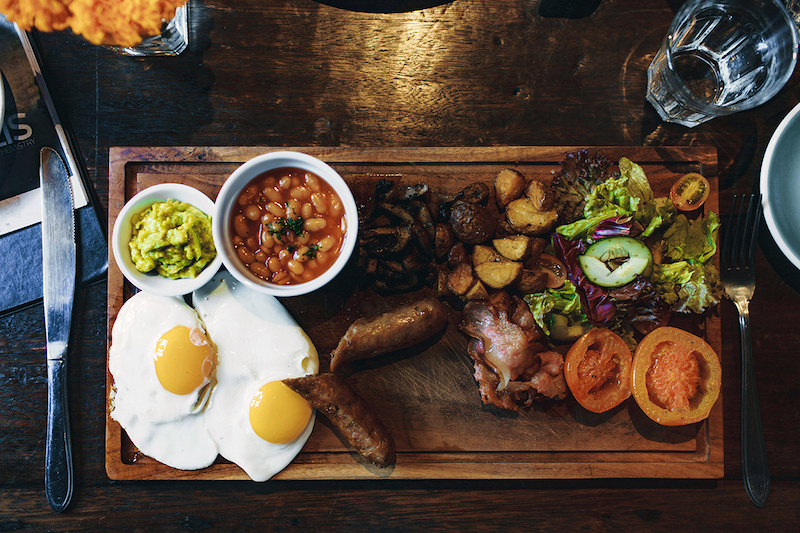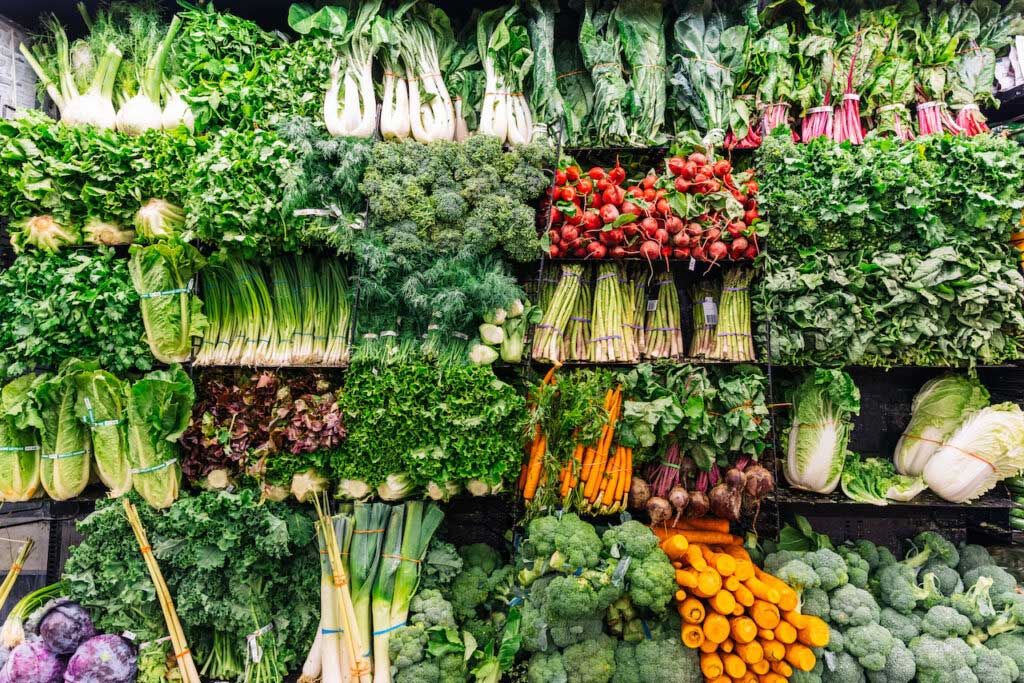Protein is having a moment. Everywhere I turn, I am being told I need more of it. Make sure you get 100 grams of protein a day! Experts say protein is the key to longevity! Here’s how I get 200 grams of protein a day in six meals (comment for link!). Perhaps my favorite entry into this genre is this reel, by Caitlin Murray, which I cackle at every time.
What is actually going on? Have we recently learned something new? Do you really need 100 grams of protein? 200? Four billion?
Let’s break it down, starting with the basics.
What is protein and how much is recommended?
Protein is one of the three macronutrients (along with carbohydrates and fat) that form the basics of the human diet. These three macronutrients provide the calories that you use to fuel your body. Protein and carbohydrates each have 4 calories per gram; fat has 9.
These macronutrients all provide basic fuel, but they do different things. Protein, in particular, contains amino acids and is used for muscle recovery and rebuilding. A diet without enough protein can lead to anemia, stunting, swelling, and other issues.
Protein comes from both plant and animal sources — meat, dairy, tofu, beans, fish, and so on. An important thing to note is that animal sources of protein tend to be complete proteins, meaning they have all nine amino acids. Many plant protein sources are incomplete (they have fewer than nine amino acids), and you want to be careful to combine them such that you get all nine. (There are some complete-protein plant sources, such as tofu and quinoa.) Protein powder and other protein supplements are derived from either plant or animal sources; whey protein (based on milk) is among the most common.

Official guidelines for protein intake suggest 0.8 grams per day per kilogram of body weight. (Yes, I know in the US we use pounds; but these recommendations are in kg so I’m going to stick with that.) One kilogram is 2.2 pounds. So, if you’re 140 pounds (roughly 63 kg) you would need 51 grams of protein a day.
The primary source of protein disagreement at this point is that some people think this number is too low — that, in fact, people should have more like 1.4 to 2 grams of protein per kilogram of body weight. (In the above example, for a person of 140 pounds or 63 kg, that’s between 88 and 126 grams per day).
We know that overconsumption of protein can also cause health issues, including digestive and renal problems. But generally up to the 2-grams-per-kg limit seems to be safe. The question is, is going up to that limit better for you?
The importance of muscle mass
To understand the rhetoric on protein, we need to understand why muscle mass is important. To vastly oversimplify (and with a huge nod to Peter Attia’s book Outlive): when you are old, you need muscles so you do not fall down and die.
Falling down is a major source of both direct and eventual mortality for the elderly. Having less muscle mass makes you more likely to fall. When people fall, it often results in a cascade of issues that can ultimately lead to death.
As you get older, your muscle mass deteriorates and it becomes harder to maintain. The logical conclusion is that as we age, we need to work to keep building and maintaining muscle. And you should focus on this early in life, since if you come into your 50s and 60s with a good baseline level, you’ll be in a better position to sustain losses.
Back to protein: A core feature of protein is that it is what you need for muscle building and recovery. As you live your life, you use your muscles to do things (walk around, sit up, exercise, etc.). This usage causes damage to your muscles, and you need the amino acids from protein to recover the muscles.
It is this twofold argument — that muscles are important, and that protein builds them — that brings us to the conclusion that more is better. The reality, though, is more complicated.
The core thing to understand is that protein doesn’t build your muscles directly without stimulus. In order to build muscle mass, you need to strain your muscles through weight-bearing exercise — really, to damage them slightly — and then have the protein ready to rebuild them back bigger. How much protein you need, then, depends on the amount of strain you are putting on your body.
Protein and muscles in athletes
There is an enormous literature on the importance of protein consumption for athletes. Data on weight lifters, for example, argues for a high protein intake and a lot of protein right after a workout. International groups of sports nutritionists promote high levels of protein intake — possibly as much as 3 grams per kg of body weight per day — with a focus on protein shortly after exercise. (Although you will often hear you need protein within 30 minutes or an hour, there isn’t a hard-and-fast rule; the benefits post-exercise last for hours.) Randomized trial data shows that higher-protein diets can help build muscle mass, even when the overall diet doesn’t have sufficient calories.
Based on these studies (and many, many others), it seems fairly clear that if you are a serious athlete, or even someone who exercises regularly, 0.8 grams per kg of body weight is not enough. For optimal athletic performance, you are likely to need more protein overall — the exact amount (1.5, 2, 2.5 grams per kg) is an open question. The answer depends on the type and intensity of exercise. Someone who is doing more weight lifting would benefit from higher protein than someone doing more cardio work (even if both would likely need more protein in general). But overall, serious athletes need more protein, after exercise and in general.
The reason for this goes back to the above: when you’re exercising, you are breaking down muscles, and protein is needed to repair them. There is something for protein to do.
Protein and muscles in non-athletes
The sports evidence is clear. It is less obvious in the data that more protein is needed for people who are more sedentary. It increasingly seems like everyone has decided it is just better to consume protein like a professional athlete. This is not the case. Eating more protein if you’re not putting your muscles under strain will not build them up. It’s not necessarily bad to have more, but you will not become the Hulk.
Having said this — and now we are at the crux of the issue — everyday activities do use your muscles, and as we age, our muscles start to decay. So it may be the case that even if you are mostly sedentary, 0.8 grams of protein per kg of body weight a day is not enough.
The evidence on the value of higher-protein diets in the general population is mixed. On bone health, the meta-analysis conclusions suggest mixed and overall small impacts. A large review of 74 randomized trials looking at health overall found small changes in blood pressure and triglycerides from higher-protein diets, but the effects were very minimal.
In the elderly, protein supplementation has been shown to improve muscle mass, especially when combined with resistance training (see above on the need to exercise). However, it’s hard to know in these studies whether the control groups were getting adequate protein (that is, they may have been below 0.8 grams/kg/day). And one study of 92 older men that directly tested a 0.8 gram/kg/day versus 1.3 gram/kg/day diet showed no change in any functional outcomes.
Does protein help with weight loss?
In the 1990s, there was a lot of talk about protein and weight loss — this was the era of the Atkins Diet. At this moment, the keto diet seems to have largely taken over that space, but these are both examples of weight-loss-focused diets that emphasize protein. More accurately, they de-emphasize carbohydrates. Carbs are replaced with protein and fat, which results in higher protein intake.
Of course, many people swear by these diets for weight loss. But as I have written about before, the efficacy of any diet in the long term depends on whether you can stick to it. Weight loss is largely about remaining in a caloric deficit. Some people find a higher-protein diet easier because they may feel more satiated. Others do not. There is no “best diet,” protein or not.
One note: If you are on a GLP-1 medication to lose weight, it is important to keep eating enough protein, because fast weight loss can take muscle with it.
Why are we hearing so much about this now?
Everything I said above is not new. So why are you hearing so much about it now?
I do not know! The evidence on protein in sports has grown over time and gotten more specific, but there hasn’t been a large breakthrough. The idea that protein is useful for muscle repair is … a basic fact of biology. My sense is that, like many pieces of dietary advice, the protein focus is a bit of a fad.
If you want to eat more protein, that’s super. Allow me to recommend Momentous chocolate protein powder and turkey Chomps, two of my favorite food groups. If you don’t want to eat more protein, chances are that is also fine.
The bottom line
- The recommended daily allowance of protein for a sedentary adult is 0.8 grams per kilogram of body weight per day. This number isn’t based on anything in particular, but there is no evidence to suggest it is systematically too low.
- If you are an exerciser, you probably need more protein. It’s unlikely you need more than 2 grams/kg/day (indeed, more might make you sick), but something in the range of 1.2 to 1.6 will help your muscle recovery.
- As we age, it is important to keep up protein intake at these levels because your muscles start to decay. This protein will be most helpful for building back muscle mass if you also do some strength training (Dad, I mean you).
- There is little evidence that high-protein diets promote weight loss, unless they are easier to stick with.




















Log in
I would love to know how you are able to get 200g of protein a day as a working mom and how/if you modify this for your kids!
How do you get so much protein while cooking for littles?? Please help!
Thanks so much for this article! Do you know of any studies that discuss protein needs specifically while breastfeeding? I’m sure it depends on whether or not the breastfeeding person is active or sedentary, but I’ve heard that the body has to repair a lot of tissue in the postpartum phase and that eating more protein than one might be accustomed to or might normally need is advisable during this time to help with tissue repair etc. I’m not sure where that advice comes from/what study, how reputable, etc. Personally, I’ve found myself craving more protein in the postpartum phase and wondering if that’s something to pay attention to or if that’s normal. (Full disclosure, I had hyperemesis during pregnancy and had to work really hard to get adequate protein so maybe it makes sense that my body would need more now that I can eat normally?) Very curious about any literature on this topic. Thanks!
How do you get 200g of protein? Especially when the family composition includes 2 littles (2yo and 4yo).
I think what’s happening is the importance of strength training with heavy weights, especially for 40+ women, is now being recognized and promoted. The need for (and discussion about) increased protein follows.
I hear about protein everywhere, thank you for speaking to it! I wonder if there is any research related to protein demands during pregnancy? I’d assume it increases.
Sending a big thanks for this post and would really like to see how you hit 200g of protein in a day. I assume this is your goal while in Half marathon training perhaps.
It seems to me that this is a direct result in the popularity of GLP-1 medication. I’m a bit biased as I live in LA, but this has become such a huge fad at least in this city. So it would make sense that influencers, nutritionists and basically anyone on social media creating content in regards to food would be talking about a higher protein intake outside of the sports world.
Maybe I’m just blissfully unaware of much social media, but nobody has been telling me to get more protein.
I think it’s a strange worry. Doctors in the US simply do not see patients coming in with protein deficiency. If they do, it’s because someone has a disorder preventing them from proper absorption, not because they don’t eat enough of it. Like this literally never happens with someone who can afford enough basic calories. Scientists even debate whether protein insufficiency is actually a thing, or whether it’s just one aspect of general lack of calories.
I think that there are so many huge intractable problems out there that people are choosing to freak out about something random and insignificant because it seems solvable. A fad to take our minds off of…everything else happening right now.
I believe the thinking is, the traditional threshold for protein deficiency (which probably informed the 0.8 grams / kg guideline) does not take into account the importance of lean muscle mass, especially as we age, in all cause mortality (like falling in your 80s, breaking a hip, then catching pneumonia in the hospital and dying from that). Happened to my grandfather! And he was running up mountains well into his 60s… (hip injury happened on a motorcycle, maybe demonstrating that mixing high risk activities with risk mitigating activities can still result in disastrous consequences).
So yeah, no protein deficiency, plenty of deaths that can be traced back to a root cause of muscular atrophy.
how should we get it?! best ways
Thanks for covering this topic. It’s an important one. But I’m a bit confused by the conclusion that there is no harm in consuming excessive protein. This commonly comes from ultra processed food and red meat, both of which are linked to problematic health outcomes. Could you square the summary about with the work in nutrition on this and e.g Prof. Christopher Gardner and team’s work on protein please? Also my understanding is that the 0.8 calculation is based on the data from the Minnesota Starvation Experiment